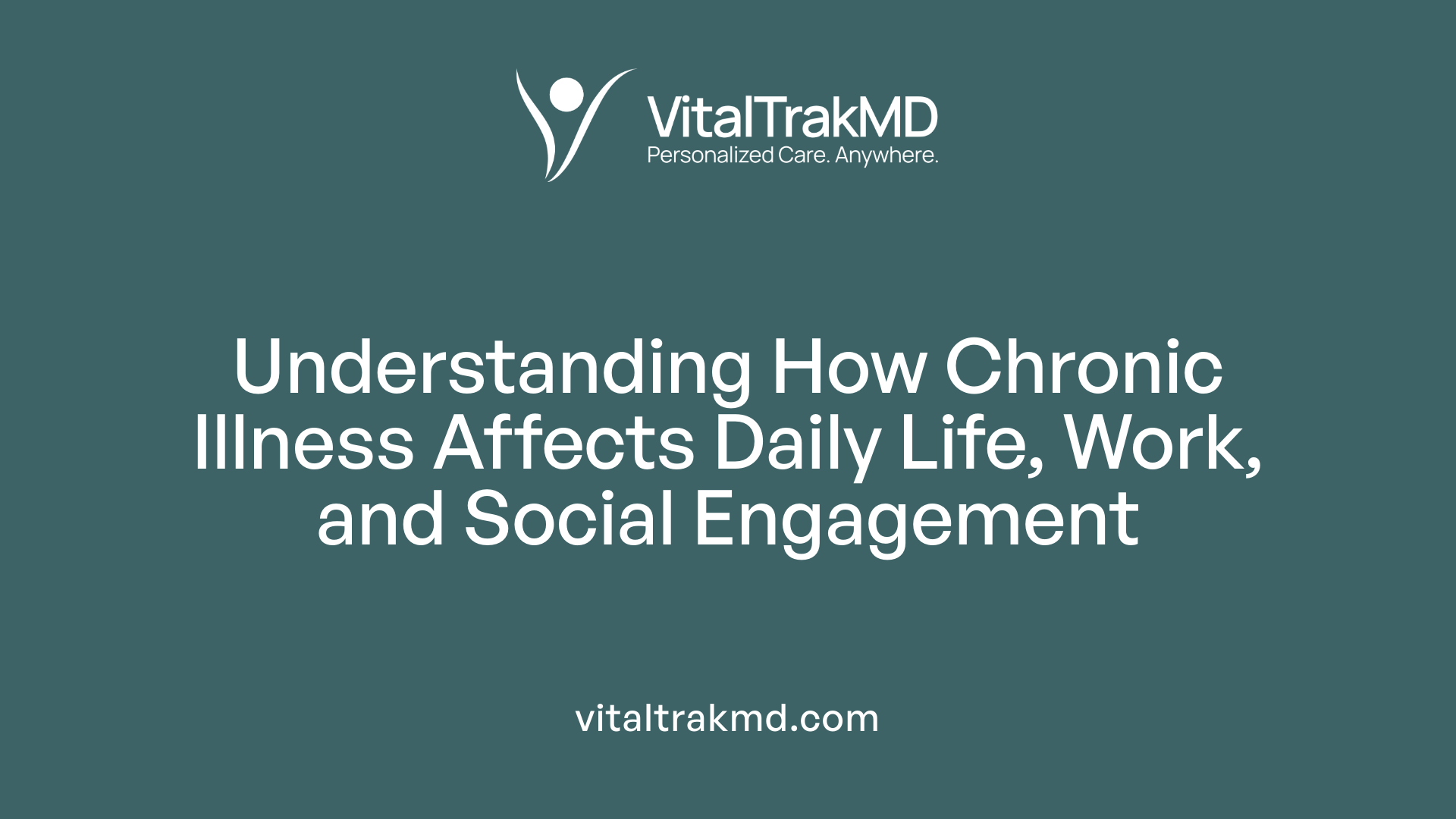The Hidden Struggles of Managing Chronic Conditions Alone

Understanding the Silent Challenges of Solo Disease Management
Living with a chronic illness is a journey fraught with visible and invisible obstacles. When management becomes a solitary pursuit, these challenges intensify, often hidden behind the everyday facade of resilience. This article explores the multifaceted struggles faced by individuals managing chronic conditions independently, shedding light on emotional, social, legal, and practical intricacies that shape their experiences.
The Complex Landscape of Independent Chronic Disease Management
What are the common challenges faced when managing chronic conditions independently?
Managing chronic conditions on your own can be quite difficult and complex. One major challenge is navigating the many aspects of care, such as medication schedules, lifestyle adjustments, and monitoring symptoms. Without proper guidance, it can be easy to feel overwhelmed or confused.
Many individuals also experience emotional stress, including anxiety and feelings of burnout. Dealing with persistent symptoms like fatigue, pain, or mobility issues can take a toll on mental health. Maintaining motivation to stick with treatment plans or lifestyle changes, such as healthy eating or regular exercise, can be especially tough without support.
Financial strain is another significant obstacle. Costs for medications, medical supplies, and frequent doctor visits can add up quickly and become burdensome, especially for those without comprehensive insurance or support systems.
In addition, limited access to technological tools—such as telemedicine, remote health monitoring, or online support communities—can hinder effective management, particularly in rural or underserved areas.
Overall, managing a chronic illness independently demands constant effort, education, emotional resilience, and practical support. Without these, individuals often face risks of poor health outcomes and increased frustration as they try to handle their health issues alone.
Psychological and Emotional Turmoil in Solo Disease Management

What are the psychological and emotional struggles associated with managing chronic illness?
Managing a chronic illness often goes beyond physical symptoms, affecting the emotional and mental health of individuals. Many people experience feelings of depression and anxiety as they navigate the ongoing challenges of their condition. The persistent pain, fatigue, and other symptoms can lead to feelings of hopelessness and frustration, particularly when treatments do not produce immediate or clear results.
Living with chronic illness can also cause significant changes in self-image. Patients may struggle with how they see themselves, especially if their condition limits their ability to work or engage in social activities. This loss of roles and abilities can lead to social withdrawal and feelings of loneliness.
The emotional toll extends to the social sphere as well, as individuals may feel misunderstood or invalidated, especially when dealing with invisible symptoms such as pain or mental health issues. Feelings of being on the outside of social life or societal participation can deepen the sense of isolation.
Both patients and healthcare providers can experience emotional exhaustion, which affects the quality of care and personal resilience. Burnout among providers, along with emotional fatigue in patients, highlights the importance of addressing mental health alongside physical health.
Addressing these emotional struggles requires an integrated approach, including mental health support, coping strategies such as mindfulness or therapy, and validation of the patient's lived experience. These efforts are vital for improving overall patient well-being and supporting successful management of the disease.
How do physical symptoms influence emotional health?
Physical symptoms like chronic pain and fatigue are not just physical issues; they directly impact emotional well-being. Constant discomfort can lead to feelings of helplessness and despair. Sleep disturbances caused by pain or discomfort further exacerbate emotional distress, creating a cycle of physical and mental health challenges.
Moreover, the unpredictability of symptoms can foster anxiety about future health and overall life stability. Patients may worry about worsening conditions or the potential for their symptoms to become debilitating.
How do these challenges affect self-image and social roles?
Changes in health status often lead to shifts in self-perception. Patients might see themselves less capable and become self-critical or socially withdrawn. Loss of employment or reduced participation in hobbies and social activities can diminish a person’s sense of purpose and belonging.
The combined impact of these factors significantly influences emotional health, emphasizing the importance of comprehensive support that addresses physical symptoms, mental health, and social engagement.
Strategies for Managing Complex and Multiple Chronic Conditions
What are effective strategies for self-managing multiple or complex chronic conditions?
Managing multiple or intricate chronic illnesses can be challenging but is essential for maintaining quality of life. One of the most effective approaches involves comprehensive care coordination. Patients should actively collaborate with multidisciplinary healthcare teams—including primary care providers, specialists, and community health workers—to ensure all aspects of their health are addressed.
Care coordination helps streamline communication, share medical records, and create unified care plans. This reduces unnecessary tests, minimizes medication conflicts, and prevents gaps in treatment. Building trusting relationships with healthcare professionals and understanding referral pathways enhance ongoing support.
Equally important is self-education. Patients need to understand their conditions, treatment options, and lifestyle implications. Lifestyle modifications such as balanced nutrition, regular physical activity, and stress management can significantly impact health outcomes.
Seeking community support and utilizing patient resources empower individuals, particularly those facing access barriers. Engaged and knowledgeable patients who actively participate in their care often experience better management, safety, and overall satisfaction.
Fostering strong patient-provider relationships increases engagement and adherence to management plans. Systematic efforts to coordinate care and equip patients with knowledge lead to better health stability and improved quality of life.
| Strategy | Description | Benefits |
|---|---|---|
| Care coordination | Collaboration among healthcare professionals | Reduces duplication, medication conflicts, enhances continuity |
| Self-education | Learning about conditions and self-care practices | Empowers patients to make informed health decisions |
| Lifestyle modifications | Adapting diet, activity, and stress management | Improves overall health, reduces symptom severity |
| Support networks | Community organizations and peer groups | Offers emotional support, shared practical advice |
Implementing these approaches helps patients navigate their health challenges more effectively, promotes safety, and fosters a proactive attitude toward managing multiple chronic conditions.
Coping with Loneliness and Emotional Isolation
Living with a chronic health condition can often feel isolating, especially when symptoms are invisible or the societal narrative emphasizes independence. Many individuals find themselves battling loneliness and emotional distress, which can impact both their mental and physical health.
Support groups and online communities play a crucial role in reducing feelings of social disconnection. Through these platforms, patients can share experiences, exchange advice, and find emotional validation in a safe space. Organizations like the National Organization for Rare Disorders (NORD) and the Genetic and Rare Diseases Information Center (GARD) offer resources that connect individuals with others facing similar challenges, fostering a sense of belonging.
Effective communication with friends and family is essential. Explaining the nuances of one’s condition and specific needs helps loved ones understand the daily struggles and enables them to provide appropriate support. Clear, honest conversation can build stronger relationships and diminish feelings of being misunderstood or unseen.
Engagement in meaningful activities, such as hobbies, volunteer work, or advocacy, can also combat loneliness. Participating in activities that provide purpose and enjoyment helps shift focus away from illness and reinforces a sense of identity beyond the condition. These pursuits contribute to emotional resilience and improve overall well-being.
Additionally, seeking support from mental health professionals can be vital. Therapists can offer coping strategies for managing depression, anxiety, or feelings of despair, which are common among those navigating chronic illness. Building social bonds and staying active emotionally are powerful tools in mitigating loneliness and fostering a positive outlook.
By actively connecting with others, openly communicating, and engaging in fulfilling activities, individuals can better manage the emotional challenges associated with chronic diseases and improve their quality of life.
Living with Invisible Struggles and Systemic Biases
What are the common risks and considerations when managing chronic diseases independently?
Managing chronic illnesses without consistent medical supervision can pose several dangers. Patients may accidentally misuse medications, which can lead to ineffective treatment or adverse side effects. Delaying medical care during flare-ups or worsening symptoms also increases the risk of complications.
Emotional burnout and social isolation are common among those managing complex conditions alone. Feelings of loneliness and a lack of understanding from others can exacerbate mental health issues such as depression and anxiety.
Several modifiable factors contribute to the risks associated with self-management. Poor lifestyle choices, including unhealthy diet, lack of physical activity, and smoking, can worsen symptoms and accelerate disease progression.
Individuals must be aware that each chronic condition requires personalized strategies. Regular health monitoring, education about their illness, and support networks are vital in preventing adverse outcomes.
Early intervention with healthcare professionals, along with strong self-care routines, can help mitigate risks. Informed decision-making and accessible resources are key to safely managing health outside formal health systems.
Impact on Daily Life, Work, and Social Participation

How does managing chronic conditions independently affect life, well-being, and daily functioning?
Living with a chronic health condition has a profound influence on various aspects of daily life. Patients often face challenges in maintaining consistent employment due to symptoms like fatigue, pain, or mobility limitations. These issues can lead to difficulties in sustaining productivity, risking job security, or missing out on career advancement.
The emotional impact is equally significant. Many individuals experience feelings of social exclusion and invisibility, especially when their conditions are not outwardly visible. This invisibility can lead to misunderstandings, stigmatization, or a sense of being misunderstood by family, friends, and colleagues.
Balancing ongoing illness management with everyday responsibilities adds another layer of stress. Patients often report feelings of burnout, frustration, and emotional exhaustion. Even when support systems are in place, managing these competing demands can be overwhelming.
The intersection of these factors may cause a sense of disconnection from society, leading individuals to feel like spectators of their own lives, missing key milestones and social participation. Overall, the compounded effects of managing a chronic condition independently can significantly diminish overall well-being and quality of life.
| Aspect | Effect | Additional Details |
|---|---|---|
| Employment | Reduced productivity, job insecurity | Missed opportunities for promotion, workplace conflicts |
| Social Participation | Withdrawal, social isolation | Inhibited involvement in community or family activities |
| Emotional Well-being | Stress, burnout, feelings of alienation | Impacted by physical symptoms and societal perceptions |
| Daily Responsibilities | Strain balancing health and chores | Increased risk of exhaustion and emotional turmoil |
Navigating these challenges requires resilience and often support from healthcare, community resources, and personal networks. Recognizing the multifaceted impact of chronic illness on daily life underscores the importance of holistic management approaches that address not just physical health but also emotional and social well-being.
Legal and Support Systems: Navigating Rights and Resources

What are the legal, support, and resource considerations for managing chronic illnesses without assistance?
Living with a chronic health condition often involves navigating various legal and support systems designed to help manage daily challenges and maintain independence.
In Alberta, legal definitions of disability consider illnesses that significantly limit major life activities. If an individual’s condition results in substantial limitations, they may qualify for various supports and accommodations. These can include modified work duties, adaptive equipment, flexible schedules, or structural changes at home to better suit their needs.
Access to financial support programs is also available for qualifying individuals. Programs like Assured Income for the Severely Handicapped (AISH) and Canada Pension Plan Disability provide vital income support, helping to alleviate the financial strain that can accompany chronic illness.
However, securing these benefits and accommodations requires understanding your rights, gathering appropriate medical documentation, and advocating for yourself. This often involves engaging with healthcare providers, social services, and employment agencies.
Community organizations and legal services can play a crucial role in helping individuals navigate complex application processes. These resources can address systemic barriers, misconceptions, or stigma that might otherwise prevent access to support.
Recognizing and effectively utilizing these legal and social supports are vital steps in managing the additional burdens of a chronic illness independently. They empower individuals to maintain their quality of life and foster greater autonomy despite ongoing health challenges.
For those seeking further guidance on these topics, searching for "disability support systems in chronic illness" can provide valuable resources and up-to-date information.
Addressing Systemic Biases and Ableism in Healthcare and Society

How does stigma affect people with invisible and chronic illnesses?
Many individuals living with chronic conditions, especially those with invisible symptoms like pain, fatigue, or mental health issues, often face societal stigma. This stigma can manifest as disbelief, blame, or a lack of understanding about their struggles. People might be dismissed or told their symptoms are 'all in their head,' which invalidates their experiences and can hinder access to appropriate care.
What is the impact of ableism on access and quality of care?
Ableism, the discrimination or prejudice against people with disabilities and chronic illnesses, plays a significant role in healthcare disparities. Systemic biases can lead healthcare providers to underestimate or overlook symptoms, especially when illnesses are not immediately visible. This results in delayed diagnoses, inadequate treatment, and reduced trust in medical systems. For patients with invisible conditions, these barriers can restrict access to necessary accommodations and support.
Why is advocacy and societal change essential?
Addressing ableism requires a collective effort to challenge societal narratives that stigmatize chronic illness and disability. Promoting awareness, education, and empathy can foster more inclusive environments. Advocacy initiatives aim to influence policy changes, improve healthcare practices, and increase public understanding.
Strategies for combating biases in healthcare and society
- Incorporate training programs for healthcare providers focused on disability competence.
- Promote patient-centered approaches that validate individual experiences.
- Support laws and policies that protect rights and ensure equitable access.
- Encourage societal narratives that recognize living well with chronic conditions as part of human diversity.
The importance of building self-advocacy skills
Empowering individuals with skills to effectively communicate their needs and challenges is vital. Education about patients' rights and available accommodations helps reduce feelings of helplessness and fosters better healthcare experiences. Community organizations and support groups play a crucial role in providing resources and advocacy training.
Understanding societal barriers through the social model of disability
This model emphasizes that societal structures and attitudes, rather than bodily impairments, create barriers. Recognizing this shifts the focus from individual correction to systemic change, including accessible environments, anti-discrimination policies, and inclusive cultures.
| Aspect | Effect on Individuals | Potential Solutions | Notes |
|---|---|---|---|
| Stigmatization and disbelief | Emotional distress, isolation | Education campaigns, public awareness | Essential to normalize chronic conditions and reduce shame |
| Access to healthcare | Delays, inadequate treatment | Provider training, patient advocacy | Focused on reducing systemic barriers |
| Social inclusion and participation | Feelings of loneliness, exclusion | Community support programs, inclusive policies | Promotes societal acceptance |
| Policy and legal protections | Limited rights and accommodations | Legislation, disability rights advocacy | Crucial for creating equitable environments |
Understanding and actively addressing societal biases and ableism are crucial steps toward creating a healthcare system and society that truly support and empower people living with chronic illnesses. Through education, advocacy, and systemic reforms, we can foster an environment where all individuals receive respectful, equitable care and recognition.
The Importance of Societal Narratives and Representation
How do cultural perceptions of chronic illness influence individual experiences?
Cultural perceptions significantly shape how individuals with chronic illnesses are viewed and how they view themselves. Societies that stereotype chronic conditions as solely a source of suffering or weakness tend to foster stigma and misunderstanding. This can lead to feelings of shame, social exclusion, and loneliness among those living with these conditions.
In many cultures, invisible illnesses such as autoimmune diseases or mental health issues are often dismissed or underestimated, which hampers support and validation. Conversely, cultures that promote awareness, resilience, and positive stories of adaptation help create an environment where individuals are more likely to feel accepted and understood.
How can reducing shame and promoting understanding improve the lives of those with chronic conditions?
Reducing shame involves challenging stereotypes and misconceptions about chronic illnesses. Public education campaigns and accurate media depictions play vital roles in transforming societal perceptions.
When communities embrace understanding and empathy, individuals are encouraged to share their experiences without fear of judgment. This openness fosters connection, decreases feelings of isolation, and empowers individuals to seek support and advocate for themselves.
Promoting understanding also involves acknowledging the systemic barriers such as ableism and societal biases, which often marginalize or silence those with invisible conditions. Recognizing these issues is essential for fostering a supportive environment where people can thrive.
How can creating inclusive narratives help in building a supportive environment?
Developing inclusive societal narratives involves portraying diverse stories of living well with chronic illnesses. These stories can highlight resilience, adaptive strategies, and personal achievements.
Such narratives challenge the predominant focus on suffering and instead emphasize human capacity and hope. Media outlets, community storytelling initiatives, and education curriculums are effective platforms for sharing these positive messages.
By showcasing a wide range of experiences and emphasizing the commonality of living with chronic illness, society can diminish stereotypes and barriers. This inclusiveness encourages participation, reduces loneliness, and enhances a sense of belonging for individuals often seen as marginalized.
Summary Table:
| Aspect | Approach | Impact |
|---|---|---|
| Cultural perceptions | Promote awareness and positive stories | Foster empathy, reduce stigma, enhance belonging |
| Reducing shame | Challenge stereotypes, advocate for accurate representation | Encourage openness, decrease isolation |
| Inclusive narratives | Share diverse, resilient stories | Build understanding, empower individuals |
Creating more expansive societal narratives about living with chronic illness is vital in transforming social attitudes. When stories of resilience and adaptation become more visible, they pave the way toward a more inclusive, understanding, and supportive society.
The Role of Socioeconomic Factors and Healthcare Access Disparities

Impacts of social determinants of health (SDOH)
Social factors such as transportation, food security, socioeconomic status, and community support significantly influence the management and outcomes of chronic illnesses. These determinants shape access to healthy foods, safe environments for physical activity, and reliable healthcare. When these social needs are unmet, individuals often experience poorer health outcomes and increased difficulty managing their conditions.
Access to care and technology disparities
Disparities in healthcare access are profound, especially among marginalized populations. Many individuals with chronic conditions struggle to see healthcare providers regularly due to costs, transportation issues, or limited provider availability. Additionally, disparities in technology access—such as reliable internet or modern devices—limit the ability to utilize telehealth services, which have become crucial for ongoing management.
Economic barriers and health inequities
Financial challenges serve as a major barrier to effective chronic illness management. High medical expenses can lead to skipped appointments, delayed treatments, or medication non-adherence. These economic barriers exacerbate health inequities, making it more difficult for underserved populations to maintain stable health. Employment issues, such as inflexible work schedules or fear of job loss, further complicate the ability to seek consistent care.
Risks and considerations when managing chronic diseases independently
Managing chronic diseases without adequate professional guidance entails significant risks. These include medication errors, delayed treatment of worsening symptoms, emotional burnout, and social isolation. Lifestyle factors—such as unhealthy diets, lack of exercise, smoking, or alcohol use—can worsen health outcomes if not properly addressed. Without proper education, regular monitoring, and support, individuals may experience complications like infections, joint deterioration, or mental health issues such as depression and anxiety.
An informed, proactive approach to self-management is vital. This involves understanding the condition, adhering to prescribed treatments, making healthy lifestyle choices, and seeking timely medical help. Support systems, including community resources and healthcare providers, play a crucial role in mitigating risks. Recognizing and addressing social and economic barriers can help improve management practices and overall health outcomes for those living with chronic illnesses.
Bridging the Gaps: From Individual Struggles to Systemic Support
Addressing the hidden struggles of managing chronic conditions alone requires a comprehensive understanding of the interwoven emotional, social, legal, and systemic challenges. While many face overwhelming physical symptoms and mental health issues, societal barriers, stigmas, and systemic biases often deepen their sense of isolation. Strengthening support systems—through policy, community, and healthcare reform—alongside fostering societal narratives of resilience and inclusivity, is essential. Equally important is empowering individuals with knowledge, advocacy skills, and access to justice and resources. Recognizing the hidden battles faced by those managing chronic illnesses solo is the first step toward building a more understanding, equitable, and supportive society.
References
- Coping with the stress and uncertainty of chronic health conditions
- The Hidden Struggle: When Chronic Illness Becomes a Disability
- Challenges of self-management when living with multiple chronic ...
- The Challenges of Managing Patients with Multiple Chronic ...
- There but not really involved: The meanings of loneliness for people ...
- Chronic health conditions take a hidden toll on U.S. workforce
- A quantitative study of the views of patients with a chronic disease ...
- Understanding the Link Between Chronic Disease and Depression
- Chronic Illness: Sources of Stress, How to Cope - Cleveland Clinic
- Emotional dimensions of chronic disease - PMC
Recent articles
Want to Feel Better and Live Healthier?
Join hundreds of patients taking control of their health with personalized care that fits their life – not the other way around.
Rated 4.8/5 by 32+ customers







